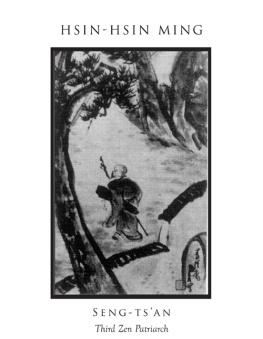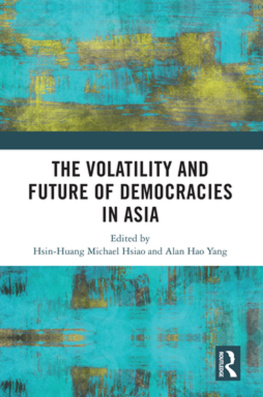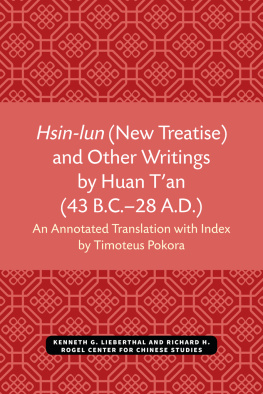Jikihara Gyokusei - Hsin-hsin Ming: Verses on the Faith-Mind
Here you can read online Jikihara Gyokusei - Hsin-hsin Ming: Verses on the Faith-Mind full text of the book (entire story) in english for free. Download pdf and epub, get meaning, cover and reviews about this ebook. City: Buffalo;N.Y, year: 2001;2014, publisher: White Pine Press, genre: Religion. Description of the work, (preface) as well as reviews are available. Best literature library LitArk.com created for fans of good reading and offers a wide selection of genres:
Romance novel
Science fiction
Adventure
Detective
Science
History
Home and family
Prose
Art
Politics
Computer
Non-fiction
Religion
Business
Children
Humor
Choose a favorite category and find really read worthwhile books. Enjoy immersion in the world of imagination, feel the emotions of the characters or learn something new for yourself, make an fascinating discovery.
- Book:Hsin-hsin Ming: Verses on the Faith-Mind
- Author:
- Publisher:White Pine Press
- Genre:
- Year:2001;2014
- City:Buffalo;N.Y
- Rating:5 / 5
- Favourites:Add to favourites
- Your mark:
- 100
- 1
- 2
- 3
- 4
- 5
Hsin-hsin Ming: Verses on the Faith-Mind: summary, description and annotation
We offer to read an annotation, description, summary or preface (depends on what the author of the book "Hsin-hsin Ming: Verses on the Faith-Mind" wrote himself). If you haven't found the necessary information about the book — write in the comments, we will try to find it.
Hsin-hsin Ming: Verses on the Faith-Mind — read online for free the complete book (whole text) full work
Below is the text of the book, divided by pages. System saving the place of the last page read, allows you to conveniently read the book "Hsin-hsin Ming: Verses on the Faith-Mind" online for free, without having to search again every time where you left off. Put a bookmark, and you can go to the page where you finished reading at any time.
Font size:
Interval:
Bookmark:
Sogensha, Osaka, Japan ISBN 1-893996-14-X This volume was published by White Pine Press, P.O. Box 236, Buffalo, NY 14201
He expressed his Realization by affirming that what Buddhists and others had called defilements are the same as Buddha Nature. That is, there is only One, undefilable, Reality. Seng-tsan received Transmission from Huike and became thereby what we call the third Chinese patriarch of Zen. He continued a poor wandering monk, eventually transmitting this Zen-essence to Tao Hsin (Doshin in Japanese), who became his successor in the teaching lineage. Nothing special. And he is said to have written this piece, the Hsin-hsin Ming, perhaps the first Chinese Zen document, provisionally translated here.
These Verses on the Faith-mind represent the essence of Zen. They encourage the awakening of spiritual intelligence and invite actualization of the essence of Zen as your own life. This is all you need. Dont be distracted by stories about Seng-tsanfor example, that he was a leper who cured himself through Zen practice, or that he may not really have been the author of these verses. And do not be diverted by attempts to define the Faith-mind. Most of all, do not be attached to stories about your self.
Just find true practice and align with it, in every moment of your life. Thus will you come to know the True Self, shared by Seng-tsan and you and all things. Thus Zen will be fulfilled in you and give abundant life to your life. May this be so for you.

Separate by the smallest amount, however, and you are as far from it as heaven is from earth. If you wish to know the truth, then hold to no opinions for or against anything. To set up what you like against what you dislike is the disease of the mind. When the fundamental nature of things is not recognized the minds essential peace is disturbed to no avail. The Way is perfect, as vast space is perfect, where nothing is lacking and nothing is in excess. Indeed, it is due to our grasping and rejecting that we do not know the true nature of things.
Live neither in the entanglements of outer things, nor in ideas or feelings of emptiness. Be serene and at one with things and erroneous views will disappear by themselves. When you try to stop activity to achieve quietude, your very effort fills you with activity. As long as you remain attached to one extreme or another you will never know Oneness. Those who do not live in the Single Way cannot be free in either activity or quietude, in assertion or denial. Deny the reality of things and you miss their reality; Assert the emptiness of things and you miss their reality.
The more you talk and think about it, the further you wander from the truth. So cease attachment to talking and thinking, and there is nothing you will not be able to know. To return to the root is to find the essence, but to pursue appearances or enlightenment is to miss the Source. To awaken even for a moment is to go beyond appearance and emptiness. Changes that seem to occur in the empty world we make real only because of our ignorance. Do not seek for the truth; only cease to cherish opinions.
Do not remain in a dualistic state; avoid such easy habits carefully. If you attach even to a trace of this and that, of right and wrong, the Mind-essence will be lost in confusion. Although all dualities arise from the One, do not be attached even to ideas of this One. When the mind exists undisturbed in the Way, there is no objection to anything in the world; and when there is no objection to anything, things cease to bein the old way. When no discriminating attachment arises, the old mind ceases to exist. Let go of things as separate existences and mind too vanishes.
Likewise when the thinking subject vanishes so too do the objects created by mind. The arising of other gives rise to self; giving rise to self generates other. Know these seeming two as facets of the One Fundamental Reality. In this Emptiness, these two are really one and each contains all phenomena. If not comparing, nor attached to refined and vulgar you will not fall into judgment and opinion. The Great Way is embracing and spacious to live in it is neither easy nor difficult.
Those who rely on limited views are fearful and irresolute: the faster they hurry, the slower they go. To have a narrow mind, and to be attached to getting enlightenment is to lose ones center and go astray. When one is free from attachment, all things are as they are, and there is neither coming nor going. When in harmony with the nature of things, your own fundamental nature, you will walk freely and undisturbed. However, when mind is in bondage, the truth is hidden, and everything is murky and unclear, and the burdensome practice of judging brings annoyance and weariness. What benefit can be derived from attachment to distinctions and separations? If you wish to move in the One Way do not dislike the worlds of senses and ideas.
Indeed, to embrace them fully is identical with true Enlightenment. The wise person attaches to no goals but the foolish person fetters himself or herself. There is one Dharma, without differentiation. Distinctions arise from the clinging needs of the ignorant. To seek Mind with the discriminating mind is the greatest of mistakes. Rest and unrest derive from illusion; with enlightenment, attachment to liking and disliking ceases.
All dualities come from ignorant inference. They are like dreams, phantoms, hallucinations it is foolish to try to grasp them. Gain and loss, right and wrong: finally abandon all such thoughts at once. If the eye never sleeps, all dreams will naturally cease. If the mind makes no discriminations, the ten thousand things are as they are, of single essence. To realize the mystery of this One-essence is to be released from all entanglements.
When all things are seen without differentiation, the One Self-essence is everywhere revealed. No comparisons or analogies are possible in this causeless, relationless state of just this One. When movement stops, there is no movement and when no movement, there is no stopping. When such dualities cease to exist Oneness itself cannot exist. To this ultimate state no law or description applies. For the Realized mind at one with the Way all self-centered striving ceases.
Font size:
Interval:
Bookmark:
Similar books «Hsin-hsin Ming: Verses on the Faith-Mind»
Look at similar books to Hsin-hsin Ming: Verses on the Faith-Mind. We have selected literature similar in name and meaning in the hope of providing readers with more options to find new, interesting, not yet read works.
Discussion, reviews of the book Hsin-hsin Ming: Verses on the Faith-Mind and just readers' own opinions. Leave your comments, write what you think about the work, its meaning or the main characters. Specify what exactly you liked and what you didn't like, and why you think so.






